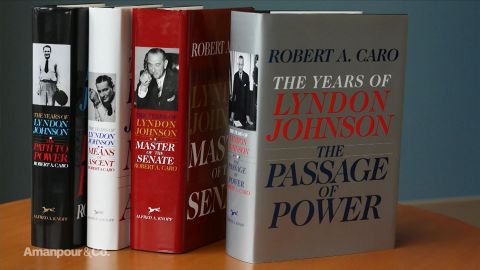Read Transcript EXPAND
(BEGIN VIDEO CLIP)
ROBERT CARO, AUTHOR, “WORKING: RESEARCHING, INTERVIEWING, WRITING”: You’re looking at four floors. I don’t know how many feet these boxes go back, but it’s a lot. Each of those boxes can hold, and a lot of them, unfortunately do, 800 pages. So, the Johnson library today says they have 44 million documents, which would be 44 million pieces of paper. What we’re reliving here, thanks to you, is the first moment I saw these and my heart really sunk at what was ahead of me.
(END VIDEO CLIP)
AMANPOUR: Your heart sunk at what was ahead of you.
CARO: Yes.
AMANPOUR: We’re going to talk about Johnson, the man, in a moment. But again, on the process of your work, you’re faced with all of that.
CARO: Yes.
AMANPOUR: And you seem to act on a piece of advice that an editor gave you a long time ago, turn every page.
CARO: Every page. That was my first piece of advice. I had never done an investigative work before. And by accident, I was thrown into something and faced with a whole room full of files from the Federal Aviation Agency, and I fell in love that night. I really loved doing the files. I wrote this memo, I left it for the real reporters. And then next Monday, the managing editor, who’s a tough old guy out of the ’20s, called his — his secretary called and said, “Alan wanted to see you right away,” I said to Ina, “Thank god we didn’t move. I’m going to be fired.
AMANPOUR: Ina, your wife?
CARO: Ina my wife.
AMANPOUR: Yes. Who was also your collaborator?
CARO: My — the sole — she’s the whole team. She’s the only person besides myself that I’ve ever trusted to do research.
AMANPOUR: So, you both do research together?
CARO: Yes.
AMANPOUR: Which is pretty amazing. But again, turn every page. I mean, that’s a huge — literally when I watched that clip, and I’m a pretty thorough journalist.
CARO: Right.
AMANPOUR: I haven’t written books but I’m a pretty through journalist. The idea of going through that amount of information is truly daunting.
CARO: But you find — you know, if you turn — if you follow his advice and you try to turn every page, not in all those boxes but in the subject that you’re talking about, you can find stuff like the secret of how Lyndon Johnson — he comes to Washington when he’s 29, and he has — he’s a junior Congressman, he has no power. All of a sudden, something changes. You see this as you’re going through the letters. In the beginning of the first three years, he’s writing to committee chairman, “Please give me five minutes of your time.” After October 1940, they’re writing him, “Please.” So, I said to Tommy Corcoran, who is this old Washington fixer, I said, “What happened in October 1940?” He said, “Money, kid. Money.” But he said, “You’re never going to be able to write about that, kid.” I said, “Why not?” He said, “Because Lyndon Johnson never put anything in writing.” So, I’m remembering this advice I got and I said, “Well, in those boxes that cover this period, I’m going to turn every page.” There’s one innocuous letter, you know, you sit there and you say, “I’m just wasting another three weeks of my life.” And then all of a sudden, he did put something in writing.
About This Episode EXPAND
Robert Caro is perhaps America’s greatest living biographer, with his books on Lyndon Johnson and Robert Caro considered the definitive works on those men. Ayelet Gundar-Goshen is a prominent Israeli novelist and psychologist and joins the program to explore the fault lines and political narratives of her home country. Emilio Estevez joins to discuss “The Public” – which he wrote and directed.
LEARN MORE


